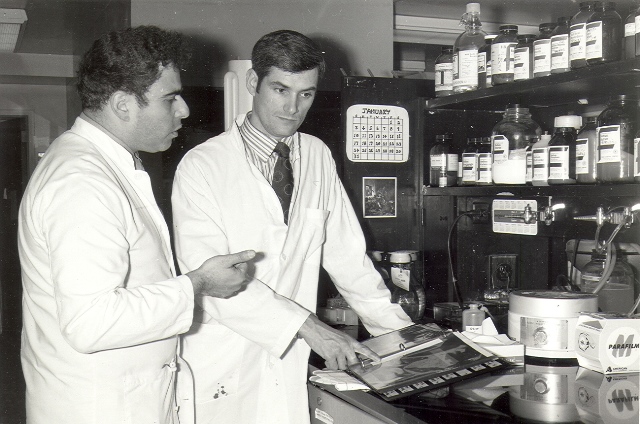A major preoccupation for cancer researchers in the early 1960’s was the search for a specific biomarker, material or molecule, that would distinguish tumour cells from regular cells – in essence, a way to identify cancer through a simple blood test.
“Numerous attempts had been made, but none had been successful. The common wisdom at the time was that such a marker would not be found,” says Dr. Phil Gold, the Douglas G. Cameron professor of Medicine at McGill University, the first director of the Goodman Cancer Centre, current Executive Director for the Research Institute of the McGill University Health Centre and former chair of the McGill Department of Medicine. “For myself and my then PhD supervisor Dr. Samuel Freedman, it sounded like a challenge we were happy to accept.”
After completing his first year of residency at the Montreal General Hospital (MGH) Dr. Gold worked on his PhD in the laboratory of Dr. Freedman, who was the director of the Division of Allergy at the MGH and subsequently dean of medicine at McGill University. In 1965 they published their discovery of the carcinoembryonic antigen (CEA), which is produced during the growth of the bowel. Subsequent studies led to the development of the CEA blood test – the first blood test approved, internationally, for the detection and management of human cancer. A lot has changed in the past five decades, but the CEA test remains the most frequently used blood test in oncology around the world today. This breakthrough discovery by the two researchers, made over 50 years ago, is a true gift from Canada to the world.
Dr. Gold shares some of his memories of the ground breaking discovery. The research utilized a few new and unique ideas: “We employed immunologic technologies, which had not been used in cancer research at that time,” he recalls. “We focused on rabbits because they are good producers of antibodies, and we used colon tumours because they grow differently from other tumours making it easier to compare the tumour tissue with normal tissue, which was taken from the same individual.”
MORE: HUMANITARIAN WORK PROMOTES A POSITIVE WORKPLACE
Drs. Gold and Freedman exposed newborn rabbits to samples of normal tissue of the human colon, to make them immunologically tolerant to these tissues. Later, they injected the rabbits with cancer cells from the same donor. The rabbits responded to the molecule in the cancer tissue. This identified the cancer molecule, which was subsequently found in human embryonic digestive organs, as well as in cancer, leading to the designation of CEA.
“The discovery of CEA was significant because it was the first time that a tumour biomarker had been clearly demonstrated to exist, even though very small amounts of CEA were also present in normal tissue,” explains Dr. Gold. “Therefore, we were able to establish a blood test that allowed us to examine the blood samples of individuals with a variety of different conditions to see if this would be helpful in the diagnosis, management, and treatment of cancer patients.”
The CEA test is the standard against which other human tumour markers are measured. It is presently the most common blood test for cancer, with an apparent market value of well over a billion dollars annually to the pharmaceutical industry. Various cancer organizations across the world have established that the blood test for CEA is instrumental in predicting the future outcome and in monitoring the management of the disease in patients with colon cancer. This discovery has helped shape the modern era of cancer immunology and tumour markers.
Making such an impactful discovery informed the trajectory of Dr. Gold’s career, “The immediate result of having discovered CEA was the excitement of suddenly having a large group of international collaborators with whom to work which led to a rapid expansion of data on CEA.” He continues, “I’m certain that the CEA phenomenon was a significant factor in allowing me to initiate the McGill (now Goodman) Cancer Centre, and to the take on the post of Physician-in-Chief at the MGH, and Chair of the Department of Medicine at McGill. These opportunities allowed me to pay back all that the university and hospital had done for me.”
MORE: PROMOTING A POSITIVE WORKPLACE
Dr. Gold’s distinguished career has earned him an induction into the Canadian Medical Hall of Fame, an appointment as an Officer of l’Ordre National du Québec, as well as a Companion of the Order of Canada, amongst other coveted awards. When asked about the future of cancer, Dr. Gold is optimistic. “I have no doubt that a variety of cures for cancer will be forthcoming. Indeed, many are already in place and such conditions as Hodgkin’s disease and Chronic Myelogenous Leukemia are now virtually curable,” he says. “In addition, many other common cancers such as those of the bowel, breast, and even lung, are now being treated with ever increasing success.”




